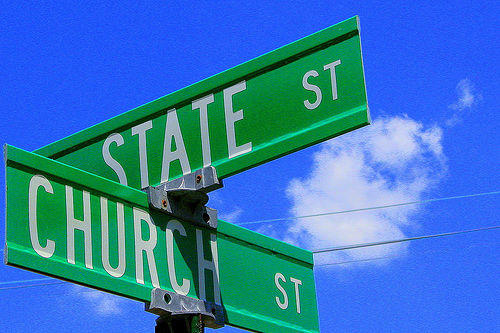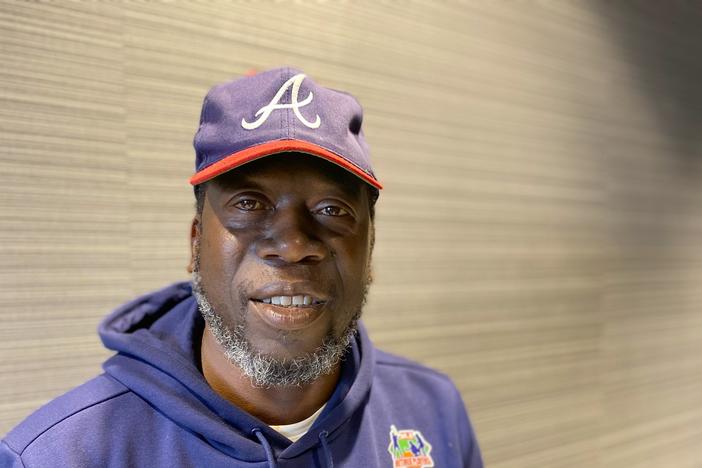Section Branding
Header Content
A Legal Perspective On Georgia's Religious Liberty Bill
Primary Content
A controversial “religious liberty” bill is on its way to Georgia Governor Nathan Deal. The Georgia legislature passed the Free Exercise Protection Act Wednesday.
Supporters say the measure protects people’s Constitutional right to freely exercise their religion. Critics say it amounts to legalized discrimination.
To understand HB 757’s legal implications, I spoke with Matt Roessing who’s an Assistant Professor of Business Law and Ethics at Georgia College.
Bevington: There are two parts to this bill. Break them down for me.
Roessing: This is a bill that was originally in two separate bills but was combined. The first part of the bill was originally called the Pastor Protection Act. It provides certain protections for pastors and faith-based organizations.
The second part of the bill is a Religious Freedom Restoration Act, very similar to the federal RFRA law that we have. Georgia did not have one and now it does.
And then there's a third section to it where it provides exceptions to each of these provisions.
Bevington: What is the biggest change to that this bill would make?
Roessing: I think the biggest change in existing law is that it specifically says that faith-based organizations and possibly non-faith-based organizations can discriminate in their hiring and who they serve on the basis of their sincerely-held religious beliefs.
Bevington: In your opinion, is that legal?
Roessing: Where I see this bill creating some controversy is that it provides an exception for discrimination. It says that nothing we say here will allow you to discriminate when that discrimination is prohibited by state or federal law. What it doesn't provide and exception for is local anti-discrimination laws. And we do have those in Georgia, particularly in the City of Atlanta.
Bevington: Was there anything that is a head-scratcher for you?
Roessing: There are a few things in the exceptions. There is an exception for prisons. The real head-scratcher for me is all the way at the end. I see this as the Kim Davis clause. We had this big controversy recently in Kentucky where the head county clerk refused to issue marriage licenses. They're saying you can't refuse to do your official duties but if you do refuse to do your official duties on the basis of religious exemption there's not much we can do to you.
Bevington: Legally, how do you see this bill playing out if Gov. Deals signs it into law (which he has not said either way we should point out).
Roessing: Legally speaking I think if it's passed it's highly likely an LGBT rights organization will challenge it. What people haven't been talking about as much is the effect it might have on non-LGBT rights cases.
The federal RFRA back in 1993 was not passed in response to gay rights issues. It was passed in response to a Supreme Court opinion where they said that two men who were member of the Native American church and were using peyote as part of a religious ceremony. They were fired from their job and then they were denied unemployment benefits. The Supreme Court said that was okay, that their religious freedom did not allow them to do something that was a violation of federal law.
Congress came in and changed that with the RFRA. That's just one of the many ways we might see this RFRA used in ways that were perhaps unintended by this legislature.
Bevington: Matt Roessing, thank you for joining me.
Roessing: My pleasure.
Here’s more from the Associated Press on Georgia leaders reactions to the legislation:
Atlanta's mayor is calling on Georgia Gov. Nathan Deal to veto a contentious bill protecting same-sex marriage opponents.
Kasim Reed, a Democrat, says the bill will harm Atlanta companies and weaken the city when competing for conventions and other events, including the Super Bowl.
Lawmakers passed the legislation on Wednesday. The changes sent to Deal's desk would prevent government burden of religious belief and government penalty against faith-based organizations, including refusal to serve or hire someone. It also protects religious officials who decline performing gay marriages.
Deal, a Republican, has until May 3 to review it.
Gay-rights advocates and business groups also are urging Deal to reject the bill. Deal's spokeswoman on Wednesday said his position hasn't changed; he has previously said he would reject any measure allowing discrimination.
Secondary Content
Bottom Content





